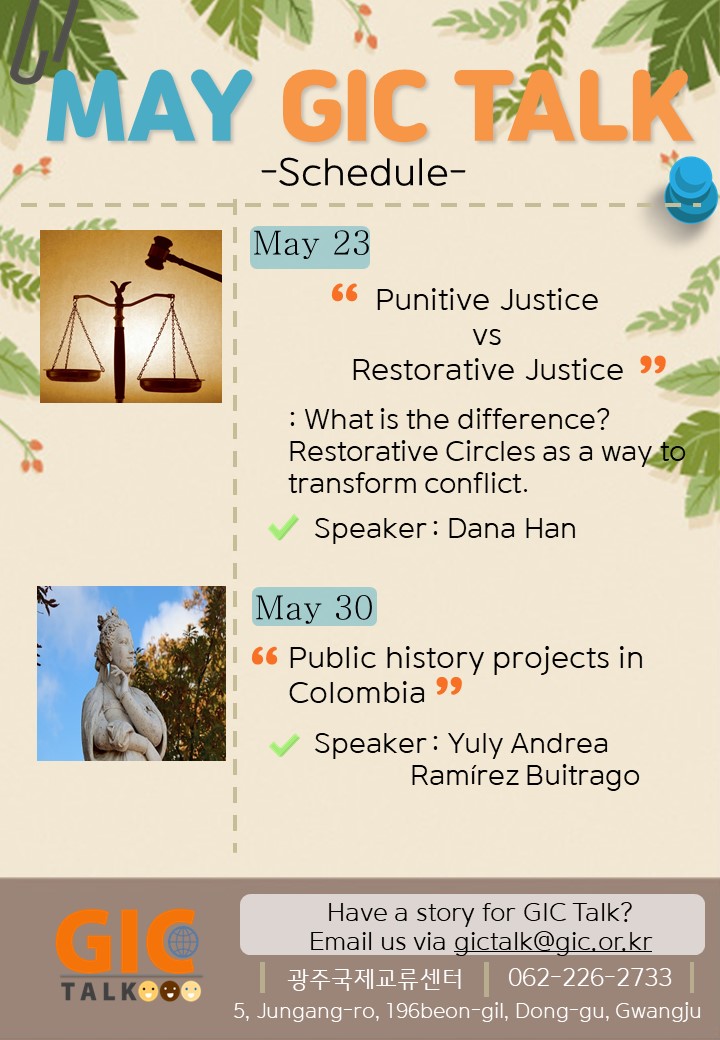공지사항
GIC 토크 5월 일정
- 작성자
- GIC
- 작성일
- 2020-05-16
- 조회 수
- 2787 회

GIC Talk는 다양한 주제의 강좌를 통해 지역민과 거주 외국인이 상호 문화를 이해하고 소통하기 위한 공개강좌입니다. 2003년 9월 시작된 이 프로그램은 통역 없이 영어로 진행되며, 문화, 역사, 정치, 예술 등 다양한 주제로 강의가 이루어집니다.
내외국인 교류 공간
대부분 지역에 거주하는 외국인 혹은 영어가 가능한 내국인이 연사로 나서지만 때로는 주한외국대사, NGO 및 NPO 대표를 초청하는 특별한 시간도 마련되고 있습니다. 강의 후에는 참가자들끼리 자유롭게 의견을 교환할 수 있는 공간을 마련하여, 지역민들의 국제적 시민역량 강화와 함께 내·외국인간 문화소통 커뮤니티 조성 활성화를 위해 노력하고 있습니다.
재능기부와 자원활동으로 진행되는 강연
GIC Talk의 내·외국인 연사들은 강좌 사례비가 없음에도 불구하고 자신의 지식과 경험을 기꺼이 나누어 주고 있습니다. 또한 내·외국인 자원활동가들이 함께 자율적으로 연사 섭외부터 강좌 사회 및 진행, 연사 및 청중 응대, 사진과 동영상 기록 작업, 후기 작성까지 강좌 진행의 전 과정에 적극적으로 참여 활동하고 있습니다.
[5월 23일]
▶주제: 처벌적 정의 vs. 회복적 정의: 무엇이 다를까? 갈등을 변환시키는 방법으로써의 회복 순환
▶연사: Dana Han
누구든 “나쁜 사람”은 “착한 사람”에게 벌을 받는다는 생각에 매우 익숙해져 있습니다. 이러한 생각과 관습에 너무나도 익숙해져 갈등을 해결할 수 있는 다른 방법이 있을지에 대해 우리 자신과 타인에게 되묻지 않습니다. 이번 워크숍이 진행되는 동안 회복적 순환 접근법을 통해 누가 그리고 어떻게 하는 것인지 알아볼 것이고 보편적인 “피해자와 가해자”에 대한 역학 관계와 어떻게 다른지 살펴볼 것입니다.
[5월 30일]
▶주제: 콜롬비아 공공역사 프로젝트
▶연사: Yuly Andrea Ramírez Buitrago
공공 역사가들은 학계 밖의 사람들과 함께 일합니다. 공공역사는 일반 대중에게 역사적 지식을 가져다 주기위해서 노력합니다. 공공역사의 실현은 박물관, 유적지, 기록 보관소, 영화, 신문 등에서 이루어집니다. 심지어, 이제는 온라인을 통해서도 가능하죠.
요즘 콜롬비아에서는 다른 대학들의 많은 프로젝트들이 역사적인 과정을 학계 밖의 사람들에게 더 많이 공유하려고 합니다. 이번 발표에서는 콜롬비아에서 이 분야에서 최근 어떤 공공역사, 어떤 프로젝트가 개발되고 발의되었는지 간략하게 설명하겠습니다.
--------------------------------------------------------------------------------------------------------------------------------------------
GIC Talk is a weekly English talk program developed for intercultural communication and understanding among local Korean citizens with international residents in Gwangju. The program started in September 2003 with only a few participants. Nowadays, dozens of Koreans and international residents take part in the Talk Program, with focus concentrating on a different topic each week. These include world cultures, social issues, history, lifestyles, political issues, speakers' experience and other areas of interest.
Community Space for Koreans and International Residents
This community space for Koreans and international residents take place on weekends. Most presenters are international residents in Gwangju, but other influential people, such as international ambassadors and representatives of NGOs or NPOs, are also invited to give a talk. Each lecture is followed by a Q&A time where people can ask the presenter questions and exchange their ideas freely. The community space allows those who attend opportunities to be more globally aware.
Program Operation
Despite not having a program budget, GIC Talk is possible thanks to local and international residents sharing their time, knowledge, and experiences. Our appreciation also goes to GIC volunteers who host, document and review the event.
[May 23]
▶Title: Punitive Justice vs. Restorative Justice: what is the difference? Restorative Circles as a way to transform conflict.
▶Speaker: Dana Han
All of us are very familiar with the idea of the "bad guy" being punished by the "good guy" (or lady ;) ). We are so used to this idea and practice, that we rarely ask ourselves and others whether there might be a different way to deal with conflicts. During this workshop we will explore the Restorative Circles approach, how it works, who can do it, and how it is different from the usual "offender-victim" dynamics. Hope to see you there!
[May 30]
▶Title: Public history projects in Colombia
▶Speaker: Yuly Andrea Ramírez Buitrago
Public historians work with and for people outside the profession. Public history tries to bring historical knowledge to the general public. Some common settings for the practice of public history are museums, historic sites, archives, film, and even newspapers. Now, it is possible to even bring this practice online.
Nowadays, in Colombia, there are many projects from different universities that are bringing historic processes closer to people outside academia. These projects are developed by both professional and in-training historians, among other actors. There is not a single, all-encompassing way of doing public history. Podcasts, articles on newspapers, radio programs, “clases a la calle”, etc. In this presentation, I will explain briefly what public history is and which initiatives and projects have recently been developed in this field in Colombia.
